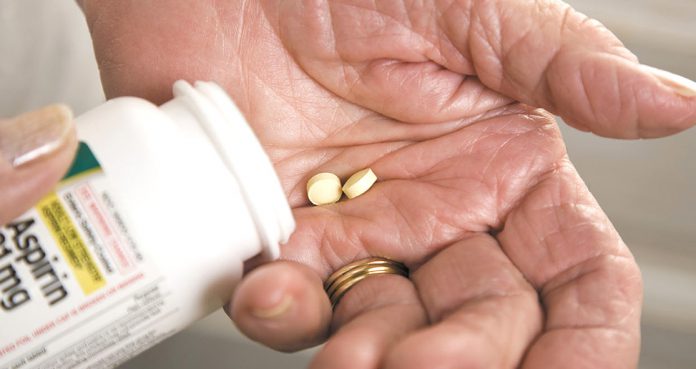Are you a healthy older adult finding new ways to reduce your risk of a heart attack or stroke? If so, do not go for that old-age standby – daily “Baby Aspirin.”
According to the new guidelines announced Sunday by the American College of Cardiology and the American Heart Association, daily low-dose aspirin is no longer recommended for the prevention of a heart attack or stroke in the elderly with no existing heart disease.
Dr. Kevin Campbell, a cardiologist from North Carolina, said, “For the most part, we are now much better at treating risk factors such as hypertension, diabetes and especially high cholesterol. This makes the biggest difference, probably negating any previously perceived aspirin benefit in primary prevention.” He was not involved in the new guidelines.
Physicians often consider prescribing aspirin for certain older people who are at the risk of experiencing a stroke or heart attack due to trouble lowering their blood cholesterol or controlling their blood sugars. They advise baby aspirin as long as there is no known history of internal bleeding, keeping the guidelines in mind.
According to European guidelines, the use of anti-clotting drugs such as aspirin is not recommended at any age.
Dr. Roger Blumenthal, John Hopkins cardiologist, who co-chaired the new guidelines, stated, “Clinicians should be very selective in prescribing aspirin for people without known cardiovascular disease. It’s much more important to optimize lifestyle habits and control blood pressure and cholesterol as opposed to recommending aspirin.”
Dr. Campbell said, “Using aspirin in younger age groups is now a class 2b recommendation, meaning that it is not necessarily the best course of action; there is much debate among experts, and the data is not definitive.”
On a personal note, the North Carolina cardiologist said, “I would advocate a healthy lifestyle, smoking cessation and risk-factor modification before even considering aspirin therapy in a patient without known cardiovascular disease.”
However, for people who have had a stroke, heart attack, open-heart surgery or angioplasty, aspirin can be a lifesaving drug.
Dr. Campbell added, “Ultimately, we must individualize treatment for each patient, based on their individual situation.”
According to three recent studies, taking a daily low-dose aspirin is a waste of money for the elderly. To make things worse, it may increase the risk of internal bleeding and even early death. Dr. Blumenthal said, “Aspirin should be limited to people at the highest risk of cardiovascular disease and a very low risk of bleeding.”





















